Business Law Report: Analysis of Business Forms for a New Venture
VerifiedAdded on 2022/10/16
|5
|1336
|18
Report
AI Summary
This business law report analyzes three primary forms of business: sole trading, partnerships, and private limited companies, focusing on their legal and financial implications. The report delves into the liabilities of each structure, highlighting how sole traders face personal liability while private limited companies offer limited liability to their owners. It examines the ease of establishment, financial requirements, and control mechanisms associated with each form, comparing the costs of setting up and the methods of raising capital. The report references relevant legal frameworks, including the Partnership Act 1980 and the case of Salomon v A Salomon & Co Ltd, to illustrate the key differences in liability, ownership, and management. The analysis concludes by recommending the most suitable business structure based on the provided scenario, emphasizing the benefits of forming a private limited company for the client's needs, particularly in terms of limited liability and access to capital.
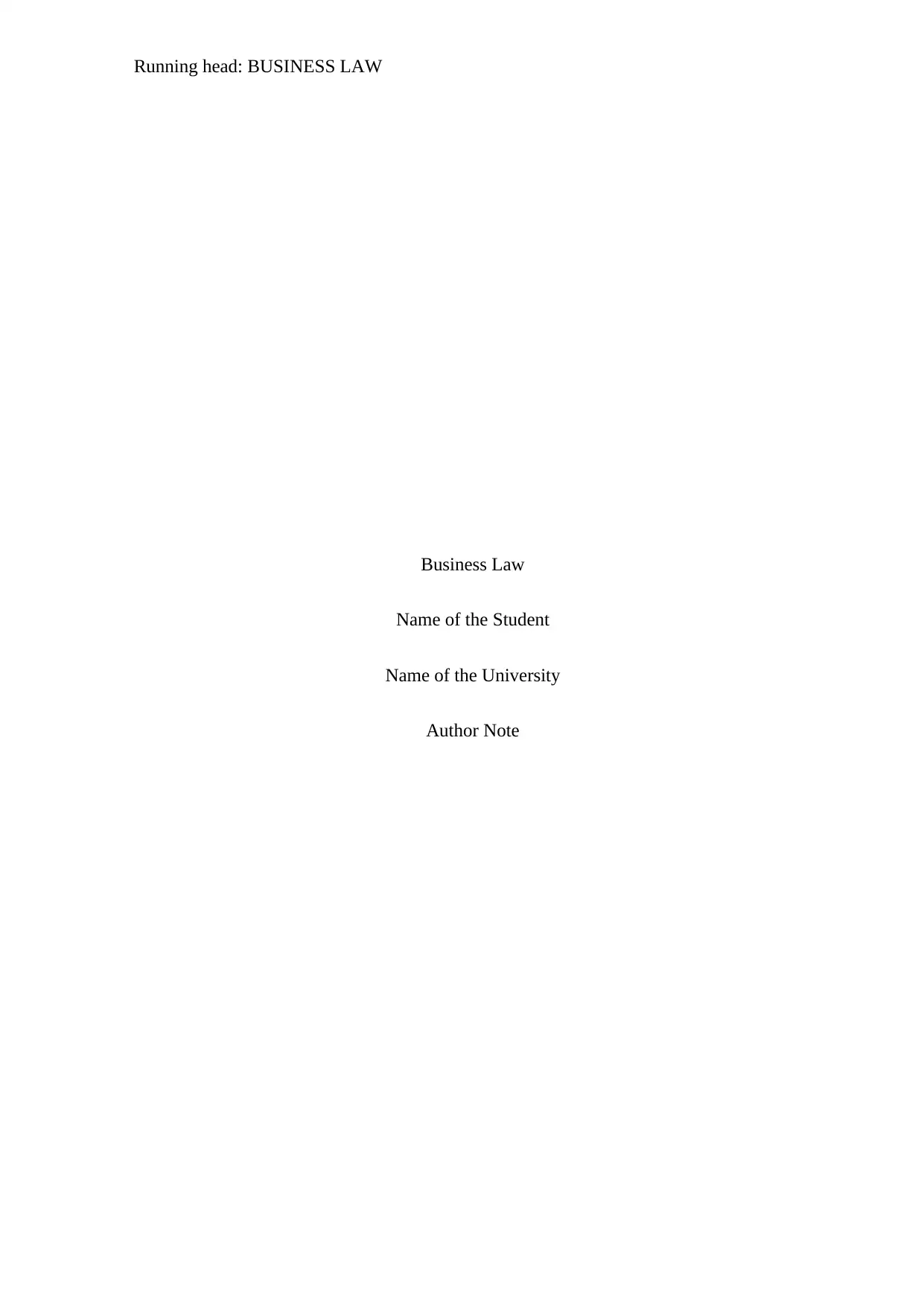
Running head: BUSINESS LAW
Business Law
Name of the Student
Name of the University
Author Note
Business Law
Name of the Student
Name of the University
Author Note
Paraphrase This Document
Need a fresh take? Get an instant paraphrase of this document with our AI Paraphraser
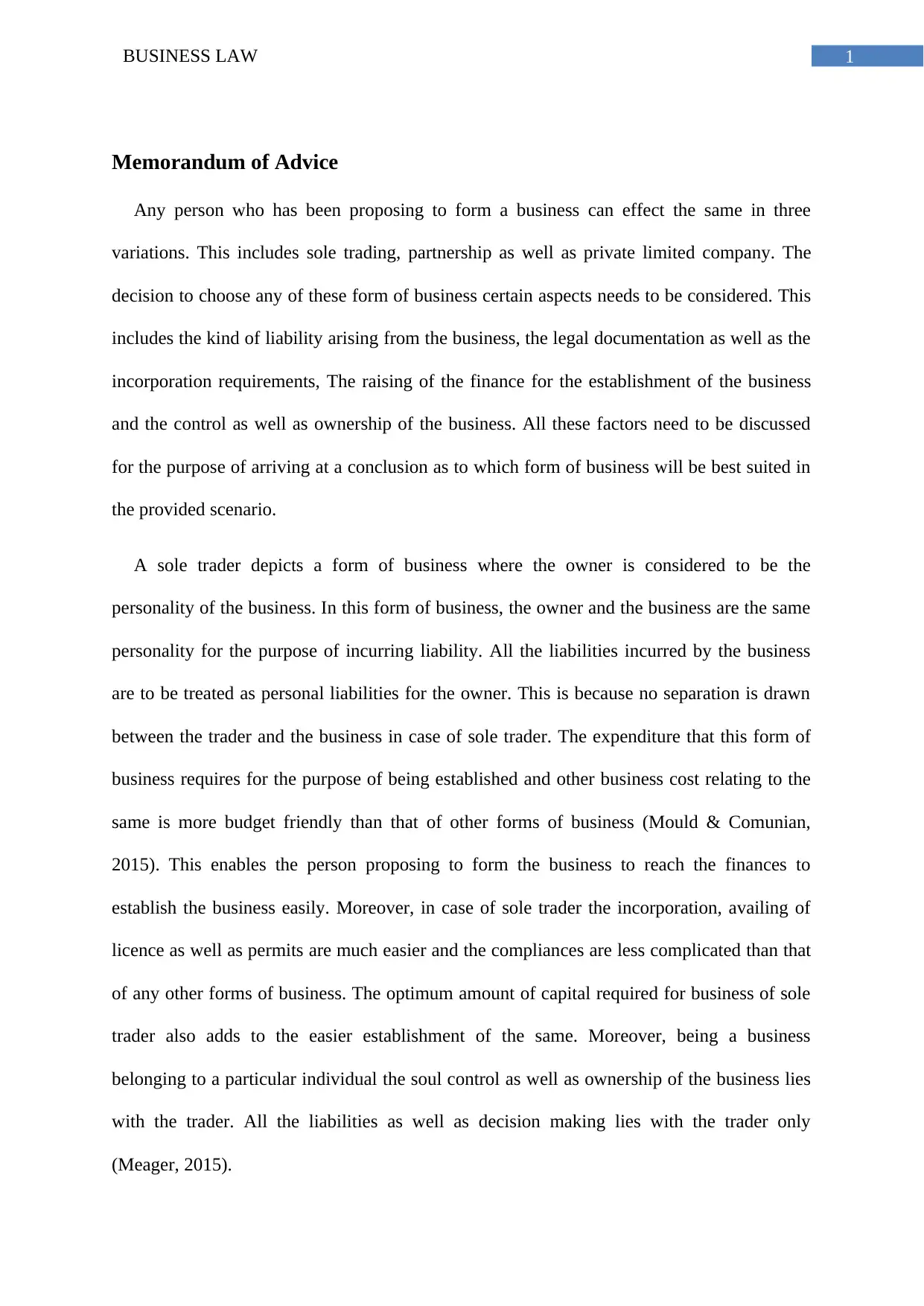
1BUSINESS LAW
Memorandum of Advice
Any person who has been proposing to form a business can effect the same in three
variations. This includes sole trading, partnership as well as private limited company. The
decision to choose any of these form of business certain aspects needs to be considered. This
includes the kind of liability arising from the business, the legal documentation as well as the
incorporation requirements, The raising of the finance for the establishment of the business
and the control as well as ownership of the business. All these factors need to be discussed
for the purpose of arriving at a conclusion as to which form of business will be best suited in
the provided scenario.
A sole trader depicts a form of business where the owner is considered to be the
personality of the business. In this form of business, the owner and the business are the same
personality for the purpose of incurring liability. All the liabilities incurred by the business
are to be treated as personal liabilities for the owner. This is because no separation is drawn
between the trader and the business in case of sole trader. The expenditure that this form of
business requires for the purpose of being established and other business cost relating to the
same is more budget friendly than that of other forms of business (Mould & Comunian,
2015). This enables the person proposing to form the business to reach the finances to
establish the business easily. Moreover, in case of sole trader the incorporation, availing of
licence as well as permits are much easier and the compliances are less complicated than that
of any other forms of business. The optimum amount of capital required for business of sole
trader also adds to the easier establishment of the same. Moreover, being a business
belonging to a particular individual the soul control as well as ownership of the business lies
with the trader. All the liabilities as well as decision making lies with the trader only
(Meager, 2015).
Memorandum of Advice
Any person who has been proposing to form a business can effect the same in three
variations. This includes sole trading, partnership as well as private limited company. The
decision to choose any of these form of business certain aspects needs to be considered. This
includes the kind of liability arising from the business, the legal documentation as well as the
incorporation requirements, The raising of the finance for the establishment of the business
and the control as well as ownership of the business. All these factors need to be discussed
for the purpose of arriving at a conclusion as to which form of business will be best suited in
the provided scenario.
A sole trader depicts a form of business where the owner is considered to be the
personality of the business. In this form of business, the owner and the business are the same
personality for the purpose of incurring liability. All the liabilities incurred by the business
are to be treated as personal liabilities for the owner. This is because no separation is drawn
between the trader and the business in case of sole trader. The expenditure that this form of
business requires for the purpose of being established and other business cost relating to the
same is more budget friendly than that of other forms of business (Mould & Comunian,
2015). This enables the person proposing to form the business to reach the finances to
establish the business easily. Moreover, in case of sole trader the incorporation, availing of
licence as well as permits are much easier and the compliances are less complicated than that
of any other forms of business. The optimum amount of capital required for business of sole
trader also adds to the easier establishment of the same. Moreover, being a business
belonging to a particular individual the soul control as well as ownership of the business lies
with the trader. All the liabilities as well as decision making lies with the trader only
(Meager, 2015).
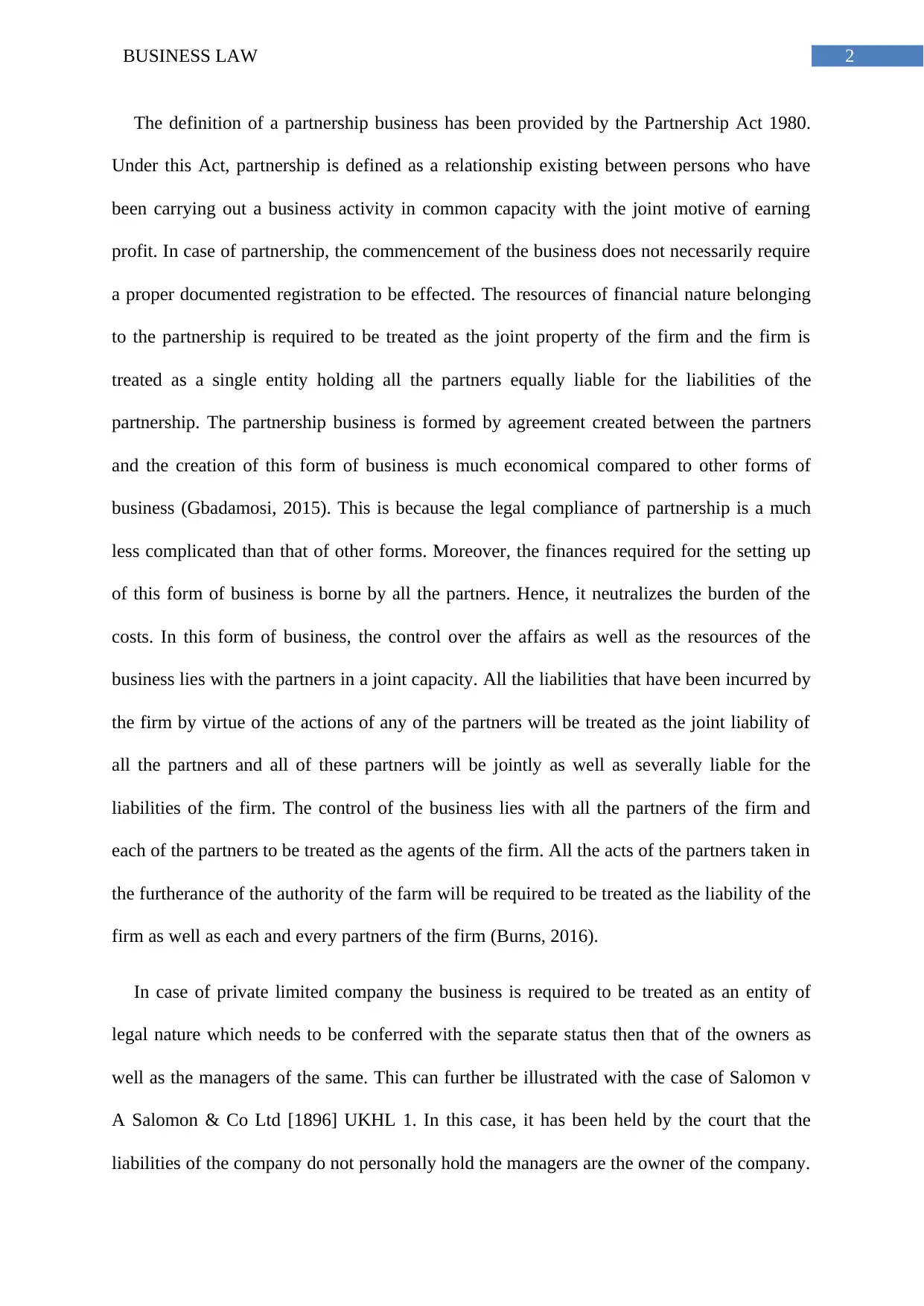
2BUSINESS LAW
The definition of a partnership business has been provided by the Partnership Act 1980.
Under this Act, partnership is defined as a relationship existing between persons who have
been carrying out a business activity in common capacity with the joint motive of earning
profit. In case of partnership, the commencement of the business does not necessarily require
a proper documented registration to be effected. The resources of financial nature belonging
to the partnership is required to be treated as the joint property of the firm and the firm is
treated as a single entity holding all the partners equally liable for the liabilities of the
partnership. The partnership business is formed by agreement created between the partners
and the creation of this form of business is much economical compared to other forms of
business (Gbadamosi, 2015). This is because the legal compliance of partnership is a much
less complicated than that of other forms. Moreover, the finances required for the setting up
of this form of business is borne by all the partners. Hence, it neutralizes the burden of the
costs. In this form of business, the control over the affairs as well as the resources of the
business lies with the partners in a joint capacity. All the liabilities that have been incurred by
the firm by virtue of the actions of any of the partners will be treated as the joint liability of
all the partners and all of these partners will be jointly as well as severally liable for the
liabilities of the firm. The control of the business lies with all the partners of the firm and
each of the partners to be treated as the agents of the firm. All the acts of the partners taken in
the furtherance of the authority of the farm will be required to be treated as the liability of the
firm as well as each and every partners of the firm (Burns, 2016).
In case of private limited company the business is required to be treated as an entity of
legal nature which needs to be conferred with the separate status then that of the owners as
well as the managers of the same. This can further be illustrated with the case of Salomon v
A Salomon & Co Ltd [1896] UKHL 1. In this case, it has been held by the court that the
liabilities of the company do not personally hold the managers are the owner of the company.
The definition of a partnership business has been provided by the Partnership Act 1980.
Under this Act, partnership is defined as a relationship existing between persons who have
been carrying out a business activity in common capacity with the joint motive of earning
profit. In case of partnership, the commencement of the business does not necessarily require
a proper documented registration to be effected. The resources of financial nature belonging
to the partnership is required to be treated as the joint property of the firm and the firm is
treated as a single entity holding all the partners equally liable for the liabilities of the
partnership. The partnership business is formed by agreement created between the partners
and the creation of this form of business is much economical compared to other forms of
business (Gbadamosi, 2015). This is because the legal compliance of partnership is a much
less complicated than that of other forms. Moreover, the finances required for the setting up
of this form of business is borne by all the partners. Hence, it neutralizes the burden of the
costs. In this form of business, the control over the affairs as well as the resources of the
business lies with the partners in a joint capacity. All the liabilities that have been incurred by
the firm by virtue of the actions of any of the partners will be treated as the joint liability of
all the partners and all of these partners will be jointly as well as severally liable for the
liabilities of the firm. The control of the business lies with all the partners of the firm and
each of the partners to be treated as the agents of the firm. All the acts of the partners taken in
the furtherance of the authority of the farm will be required to be treated as the liability of the
firm as well as each and every partners of the firm (Burns, 2016).
In case of private limited company the business is required to be treated as an entity of
legal nature which needs to be conferred with the separate status then that of the owners as
well as the managers of the same. This can further be illustrated with the case of Salomon v
A Salomon & Co Ltd [1896] UKHL 1. In this case, it has been held by the court that the
liabilities of the company do not personally hold the managers are the owner of the company.
⊘ This is a preview!⊘
Do you want full access?
Subscribe today to unlock all pages.

Trusted by 1+ million students worldwide
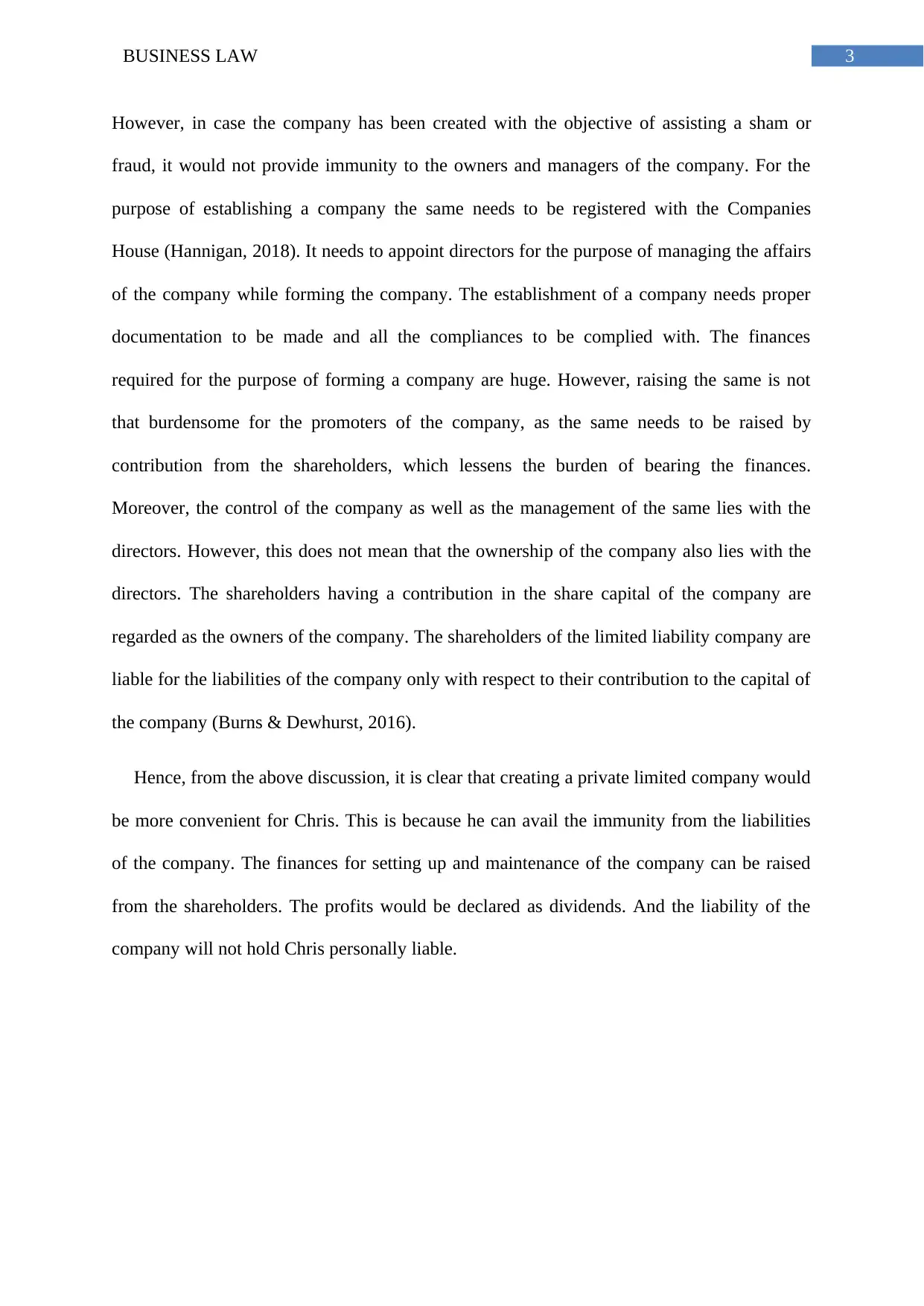
3BUSINESS LAW
However, in case the company has been created with the objective of assisting a sham or
fraud, it would not provide immunity to the owners and managers of the company. For the
purpose of establishing a company the same needs to be registered with the Companies
House (Hannigan, 2018). It needs to appoint directors for the purpose of managing the affairs
of the company while forming the company. The establishment of a company needs proper
documentation to be made and all the compliances to be complied with. The finances
required for the purpose of forming a company are huge. However, raising the same is not
that burdensome for the promoters of the company, as the same needs to be raised by
contribution from the shareholders, which lessens the burden of bearing the finances.
Moreover, the control of the company as well as the management of the same lies with the
directors. However, this does not mean that the ownership of the company also lies with the
directors. The shareholders having a contribution in the share capital of the company are
regarded as the owners of the company. The shareholders of the limited liability company are
liable for the liabilities of the company only with respect to their contribution to the capital of
the company (Burns & Dewhurst, 2016).
Hence, from the above discussion, it is clear that creating a private limited company would
be more convenient for Chris. This is because he can avail the immunity from the liabilities
of the company. The finances for setting up and maintenance of the company can be raised
from the shareholders. The profits would be declared as dividends. And the liability of the
company will not hold Chris personally liable.
However, in case the company has been created with the objective of assisting a sham or
fraud, it would not provide immunity to the owners and managers of the company. For the
purpose of establishing a company the same needs to be registered with the Companies
House (Hannigan, 2018). It needs to appoint directors for the purpose of managing the affairs
of the company while forming the company. The establishment of a company needs proper
documentation to be made and all the compliances to be complied with. The finances
required for the purpose of forming a company are huge. However, raising the same is not
that burdensome for the promoters of the company, as the same needs to be raised by
contribution from the shareholders, which lessens the burden of bearing the finances.
Moreover, the control of the company as well as the management of the same lies with the
directors. However, this does not mean that the ownership of the company also lies with the
directors. The shareholders having a contribution in the share capital of the company are
regarded as the owners of the company. The shareholders of the limited liability company are
liable for the liabilities of the company only with respect to their contribution to the capital of
the company (Burns & Dewhurst, 2016).
Hence, from the above discussion, it is clear that creating a private limited company would
be more convenient for Chris. This is because he can avail the immunity from the liabilities
of the company. The finances for setting up and maintenance of the company can be raised
from the shareholders. The profits would be declared as dividends. And the liability of the
company will not hold Chris personally liable.
Paraphrase This Document
Need a fresh take? Get an instant paraphrase of this document with our AI Paraphraser
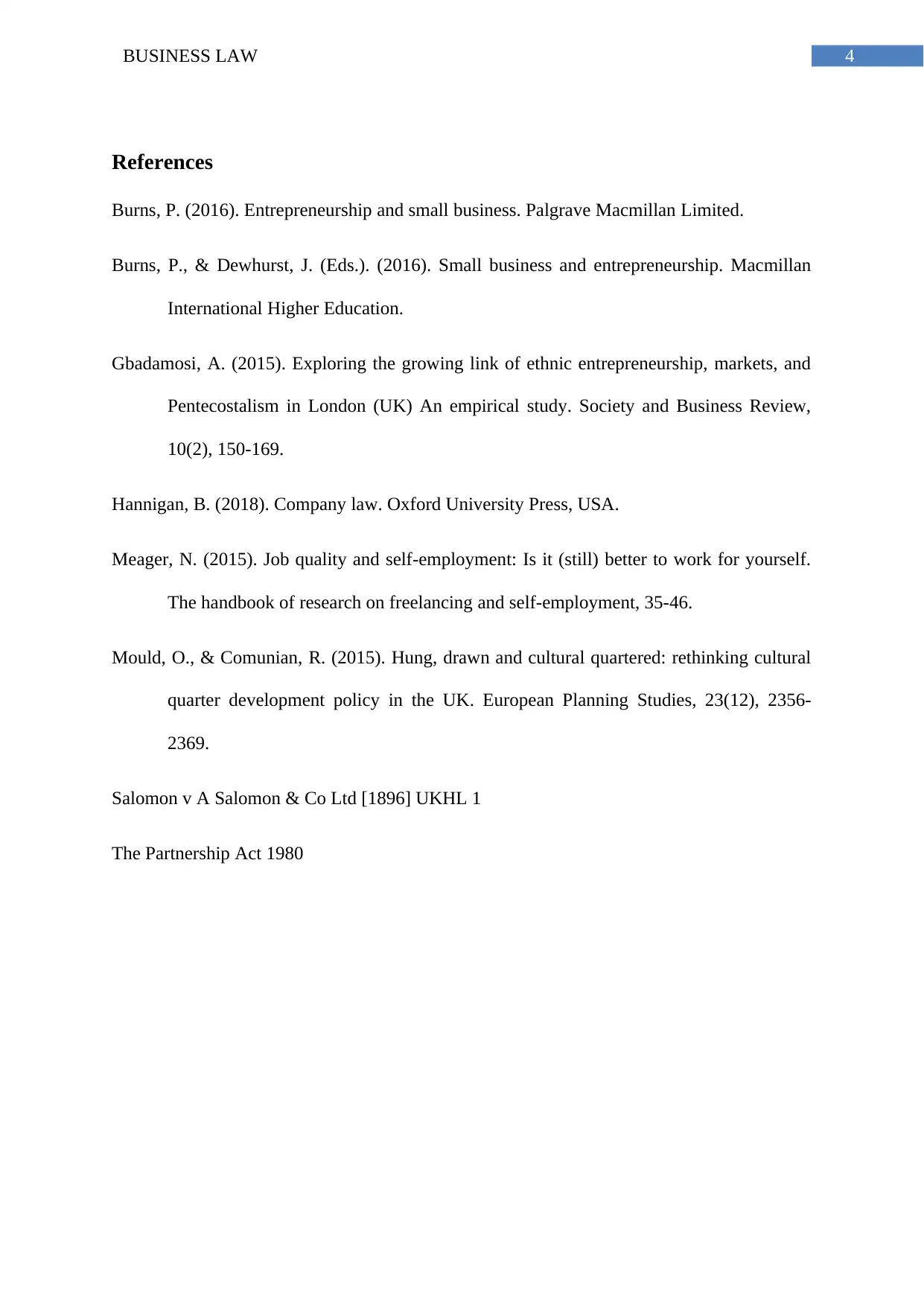
4BUSINESS LAW
References
Burns, P. (2016). Entrepreneurship and small business. Palgrave Macmillan Limited.
Burns, P., & Dewhurst, J. (Eds.). (2016). Small business and entrepreneurship. Macmillan
International Higher Education.
Gbadamosi, A. (2015). Exploring the growing link of ethnic entrepreneurship, markets, and
Pentecostalism in London (UK) An empirical study. Society and Business Review,
10(2), 150-169.
Hannigan, B. (2018). Company law. Oxford University Press, USA.
Meager, N. (2015). Job quality and self-employment: Is it (still) better to work for yourself.
The handbook of research on freelancing and self-employment, 35-46.
Mould, O., & Comunian, R. (2015). Hung, drawn and cultural quartered: rethinking cultural
quarter development policy in the UK. European Planning Studies, 23(12), 2356-
2369.
Salomon v A Salomon & Co Ltd [1896] UKHL 1
The Partnership Act 1980
References
Burns, P. (2016). Entrepreneurship and small business. Palgrave Macmillan Limited.
Burns, P., & Dewhurst, J. (Eds.). (2016). Small business and entrepreneurship. Macmillan
International Higher Education.
Gbadamosi, A. (2015). Exploring the growing link of ethnic entrepreneurship, markets, and
Pentecostalism in London (UK) An empirical study. Society and Business Review,
10(2), 150-169.
Hannigan, B. (2018). Company law. Oxford University Press, USA.
Meager, N. (2015). Job quality and self-employment: Is it (still) better to work for yourself.
The handbook of research on freelancing and self-employment, 35-46.
Mould, O., & Comunian, R. (2015). Hung, drawn and cultural quartered: rethinking cultural
quarter development policy in the UK. European Planning Studies, 23(12), 2356-
2369.
Salomon v A Salomon & Co Ltd [1896] UKHL 1
The Partnership Act 1980
1 out of 5
Related Documents
Your All-in-One AI-Powered Toolkit for Academic Success.
+13062052269
info@desklib.com
Available 24*7 on WhatsApp / Email
![[object Object]](/_next/static/media/star-bottom.7253800d.svg)
Unlock your academic potential
Copyright © 2020–2026 A2Z Services. All Rights Reserved. Developed and managed by ZUCOL.





